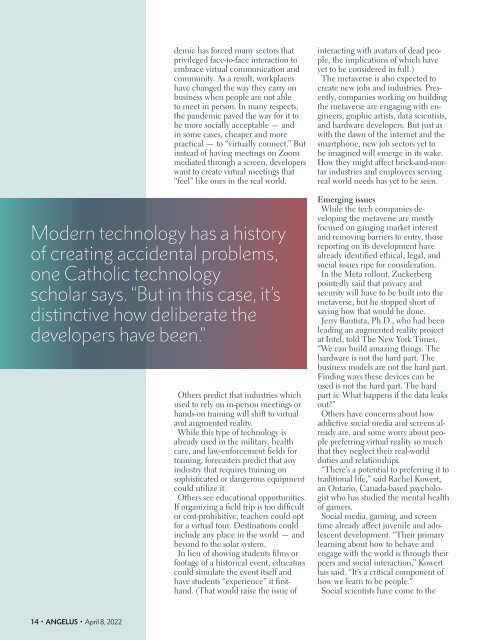Angelus News | April 8, 2022 | Vol. 7 No. 7
On the cover: The notion of the “metaverse,” touted by tech executives like Facebook’s Mark Zuckerberg, is no longer a far-off idea. In fact, we may be gradually entering it through our growing reliance on gadgets and the internet to get through daily life. On Page 12, Elise Ureneck looks into where the metaverse wants to take us and whether people of faith should resist or try to shape a world that isn’t totally “real.”
On the cover: The notion of the “metaverse,” touted by tech executives like Facebook’s Mark Zuckerberg, is no longer a far-off idea. In fact, we may be gradually entering it through our growing reliance on gadgets and the internet to get through daily life. On Page 12, Elise Ureneck looks into where the metaverse wants to take us and whether people of faith should resist or try to shape a world that isn’t totally “real.”
You also want an ePaper? Increase the reach of your titles
YUMPU automatically turns print PDFs into web optimized ePapers that Google loves.
demic has forced many sectors that<br />
privileged face-to-face interaction to<br />
embrace virtual communication and<br />
community. As a result, workplaces<br />
have changed the way they carry on<br />
business when people are not able<br />
to meet in person. In many respects,<br />
the pandemic paved the way for it to<br />
be more socially acceptable — and<br />
in some cases, cheaper and more<br />
practical — to “virtually connect.” But<br />
instead of having meetings on Zoom<br />
mediated through a screen, developers<br />
want to create virtual meetings that<br />
“feel” like ones in the real world.<br />
Modern technology has a history<br />
of creating accidental problems,<br />
one Catholic technology<br />
scholar says. “But in this case, it’s<br />
distinctive how deliberate the<br />
developers have been.”<br />
Others predict that industries which<br />
used to rely on in-person meetings or<br />
hands-on training will shift to virtual<br />
and augmented reality.<br />
While this type of technology is<br />
already used in the military, health<br />
care, and law-enforcement fields for<br />
training, forecasters predict that any<br />
industry that requires training on<br />
sophisticated or dangerous equipment<br />
could utilize it.<br />
Others see educational opportunities.<br />
If organizing a field trip is too difficult<br />
or cost-prohibitive, teachers could opt<br />
for a virtual tour. Destinations could<br />
include any place in the world — and<br />
beyond to the solar system.<br />
In lieu of showing students films or<br />
footage of a historical event, educators<br />
could simulate the event itself and<br />
have students “experience” it firsthand.<br />
(That would raise the issue of<br />
interacting with avatars of dead people,<br />
the implications of which have<br />
yet to be considered in full.)<br />
The metaverse is also expected to<br />
create new jobs and industries. Presently,<br />
companies working on building<br />
the metaverse are engaging with engineers,<br />
graphic artists, data scientists,<br />
and hardware developers. But just as<br />
with the dawn of the internet and the<br />
smartphone, new job sectors yet to<br />
be imagined will emerge in its wake.<br />
How they might affect brick-and-mortar<br />
industries and employees serving<br />
real world needs has yet to be seen.<br />
Emerging issues<br />
While the tech companies developing<br />
the metaverse are mostly<br />
focused on gauging market interest<br />
and removing barriers to entry, those<br />
reporting on its development have<br />
already identified ethical, legal, and<br />
social issues ripe for consideration.<br />
In the Meta rollout, Zuckerberg<br />
pointedly said that privacy and<br />
security will have to be built into the<br />
metaverse, but he stopped short of<br />
saying how that would be done.<br />
Jerry Bautista, Ph.D., who had been<br />
leading an augmented reality project<br />
at Intel, told The New York Times,<br />
“We can build amazing things. The<br />
hardware is not the hard part. The<br />
business models are not the hard part.<br />
Finding ways these devices can be<br />
used is not the hard part. The hard<br />
part is: What happens if the data leaks<br />
out?”<br />
Others have concerns about how<br />
addictive social media and screens already<br />
are, and some worry about people<br />
preferring virtual reality so much<br />
that they neglect their real-world<br />
duties and relationships.<br />
“There’s a potential to preferring it to<br />
traditional life,” said Rachel Kowert,<br />
an Ontario, Canada-based psychologist<br />
who has studied the mental health<br />
of gamers.<br />
Social media, gaming, and screen<br />
time already affect juvenile and adolescent<br />
development. “Their primary<br />
learning about how to behave and<br />
engage with the world is through their<br />
peers and social interaction,” Kowert<br />
has said. “It’s a critical component of<br />
how we learn to be people.”<br />
Social scientists have come to the<br />
14 • ANGELUS • <strong>April</strong> 8, <strong>2022</strong>


















